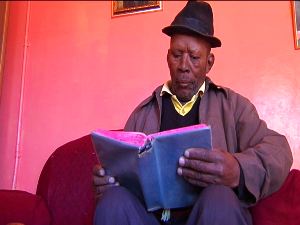June 27, 2013Produced by Amos Phago
We travel to the Northern Cape where two different communities are united by their struggles to gain control of the mineral-rich land which they have successfully claimed back, but still cannot benefit from.
First, we travel to the diamond-rich Pniel, a village which is a few kilometres outside of Kimberley where the community launched a successful land claim in 1997 after the Lutheran Church, which owned the land, apparently ordered the youth between the ages 16-18 to leave the farm. The state bought the farm for R63 million. Through its Community Property Association, the community entered into a joint venture with Blue Dust mining company. Under the agreement, the company would have access to the mineral rich land for 25 years in exchange for 20% of the dividends. But, the state is disputing the terms of this agreement and is currently withholding the title deeds of these communities. This means that people like Johannes Sekotse, 70, cannot fully realise the benefits of the land which he says he rightfully owns. We also travel to Maremane, also in the Northern Cape, where we meet 35-year old Boitumelo Medupe, whose parents were removed from Lohatla in 1976 under the Natives Land act. He is one of the community members who opted for resettlement instead of financial compensation. Despite staying on the manganese-rich land in Maremane, Boitumelo cannot find a proper job. The community has no basic services such as water, sanitation, electricity, roads and housing. We look at the power struggles that often characterise communities involved in these kinds of disputes, some of it involving government officials, who manipulate processes for either political or financial reasons.The post-Apartheid government committed itself to, amongst others; reverse the impact of the 1913 Land Act by returning the land back to its rightful owners through land redistribution and restitution programmes. Although significant progress has been made with regard to restitutions, communities such as these remain poor despite having successfully claimed back their land. What more does the state need to do to ensure that these processes have real meaning and significance to their beneficiaries?
– By


